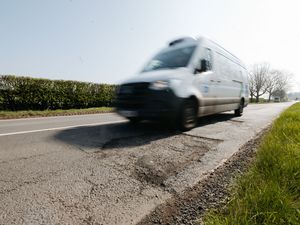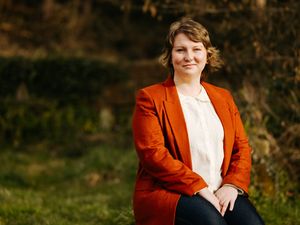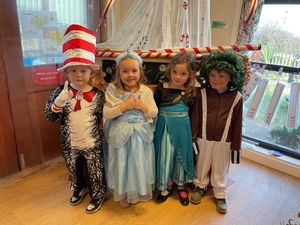The day the first flying saucer was seen
Seventy-three years ago this week, Kenneth Arnold was flying his private plane over Mineral, Washington, when he saw a bright flashing light.
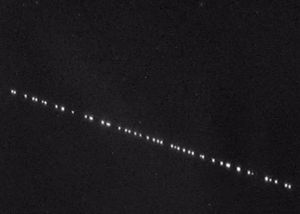
Believing he might have been dangerously close to another plane, he scanned the sky, but all he could see was a DC4 about 15 miles behind.
And then he saw nine dazzling flashes in quick succession. At first he thought they might be reflections on his plane's windows, but when he rolled down the side window, this proved not to be the case.
They appeared in the distance, off to his left, or north of Mount Rainier, about 20 to 25 miles away. The reflections clearly came from flying objects, moving in a long chain, and briefly wondered whether they might be a flock of geese, but the altitude, bright glint, not to mention the extremely rapid speed made that extremely unlikely.
The only explanation was a new aircraft being tested by the US military, but even so, the speeds seemed quite phenomenal. Arnold timed the craft making their way from Mount Rainier and Mount Adams, about 50 miles apart, in one minute 42 seconds. This meant a speed of 1,700mph, or twice the speed of sound, four months before Chuck Yeager made the world's first supersonic flight.
Sceptical
Nobody ever got to the bottom of what Arnold saw, but his reported description of the objects as looking like an item of crockery not only introduced the term 'flying saucer' into the English language, it also sparked decades of debate about whether other planets are inhabited by advanced life forms preparing to colonise earth.
Historian Mike Dash said that journalists who were initially sceptical about Arnold's story quickly overcame their doubts when they interviewed him the next day.
"Arnold had the makings of a reliable witness," said Dash. "He was a respected businessman and experienced pilot, and seemed to be neither exaggerating what he had seen, nor adding sensational details to his report. He also gave the impression of being a careful observer. These details impressed the newspapermen who interviewed him and lent credibility to his report."
Arnold's sighting was partly corroborated by a prospector called Fred Johnson on Mount Adams, who told US Army Air Force officials that he saw six of the objects about the same time as Arnold, using a telescope. Air force officials described Johnson as a credible witness, and his account was listed as the first unexplained UFO report in its files. Yet while they both appeared to be describing the same sighting, Arnold's was dismissed as a mirage.
Reports of mysterious objects flying around go back to at least the 13th century, with sightings of a silver disc flying over Yorkshire as early as 1290. But it was Arnold's account – coupled with his statement a fortnight later, when he raised the prospect of extraterrestrial beings – that started people questioning whether the aliens really were coming.
In the months that followed, hundreds of sightings of mostly saucer-like objects were reported, predominantly in the US. The most widely publicised came from a United Airlines crew on July 4, where nine more disc-like objects were said to be pacing their plane over Idaho, not far from Arnold's initial sighting. There was much excitement on July 8 when the Army Air Force base at Roswell, New Mexico issued a press release saying that they had recovered a 'flying disc' from a nearby ranch. The so-called Roswell UFO was big news, until the military issued a retraction saying that it was actually a weather balloon.
On July 9, the Army Air Force Directorate of Intelligence, assisted by the FBI, began a secret study of a number of the flying saucer reports, including Arnold's and the United Airlines' crew. They concluded that something was really flying around, but shed little light on what it was.
Closer to home, there have been two famous sightings at the RAF Cosford airbase, near Albrighton.

It is claimed that around 11.30pm on December 10, 1963, a dome-shaped UFO touched down on the base, bathed the surrounding area in a beam of green light, and was seen at close quarters by at least two RAF apprentices. Rumours quickly spread that something extraordinary had happened, and on January 9, 1964, Stafford UFO investigator Wilfred Daniels interviewed the Rev B G Henry about the incident. Their subsequent recollections of the conversation differ wildly.
In a letter to Flying Saucer Review magazine, Daniels wrote: “Flight Lieutenant Henry said that publication of his name would cause him trouble; that it was ‘more than his job was worth’ to arrange a meeting between me and the two RAF apprentices; that he really ought not to be talking to me about it at all; that security had dropped right down on the whole thing.”
But in a letter to the Air Ministry, Flying Officer R A Roberts at Cosford said Henry "categorically denies all statements attributed to him" and was considering legal action.
Waveney Girvan, editor of Flying Saucer Review, fired off a string of letters to get to the bottom of the mystery. He said the Air Ministry tried to explain the sighting variously as being ‘Nothing at all’, ‘two drunk apprentices’, ‘a hoax’ and – most strangely of all – ‘a British Railways steam train’.
The drunken apprentices theory may have sounded plausible, but almost 30 years later there was another incident at the base.
At 1.15am on March 31, 1993, an MoD policeman reported seeing bright lights above the airbase.
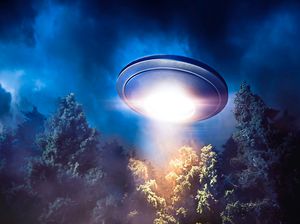
The meteorological officer at nearby Shawbury was alerted to keep a lookout, and reported seeing 'a vast triangular shaped craft flying at about 200ft' which made a low humming noise and fired a narrow beam of light which swept the ground. But the met man later said it may have been a police helicopter.
In 1971, Pc Les Leek, from Aldridge, near Walsall, photographed a strange, round object in the sky over Staffordshire. He said he and four other officers kept watch on it for over two hours. At the time, the Ministry of Defence said it had a special department for looking into UFO sightings It said of 1,497 sightings between January 1959 and December 31, 1970, 538 were caused by aircraft, 322 by satellites and other space debris, 110 by meteorites and natural phenomena, and 115 by other 'miscellaneous' causes.
In 1987 Brett Forrest was walking along Moor Street in Brierley Hill, near Dudley at about 7pm on November 19, returning from a shopping errand for his mother Barbara.
The 27-year-old noticed flashing lights above the chimney of the Royal Brierley glassworks.
"Suddenly more lights started to appear and flew around the first two," he later said. "They all formed into a diamond-like formation. At this point I stopped dead and was just transfixed."
He said that as the lights started to dim, he noticed a huge triangular object, that started making its way towards him.
"It was coming at me, albeit in a 'step-like' manner getting lower and lower as it drew nearer," said Mr Forrest. "It stopped directly above me, about 40ft above the street light under which I was standing.
"Looking up, I could see that the 'craft' had a groove-like structure on its underside – coloured black, silver and bronze. It was a perfect triangle."
He banged on the window of his mother's flat, and she too witnessed the spectacle. It later emerged that a number neighbours said they had seen it too.
There seems little doubt that many people have genuinely seen something unusual in the sky. But the question is whether what they have seen relates to extraterrestrial activity, or whether there is a simpler explanation for it.
For example, in January this year, a number of people in Shrewsbury noticed a trail of lights across the night sky. But it wasn't the little green men coming to take over, but a satellite train forming part of Elon Musk's SpaceX programme
David Gordon, a lecturer in psychology at University Centre Shrewsbury, says people are more likely to believe in aliens if they have what is known as 'reflexive open mindedness.'
He says: "It's good to have an open mind to different ideas, but reflexive open mindedness comes when you can't accept what you are told without thinking about it.
"It is common among people who are a little bit neurotic.
"In the Middle Ages it might have been demons attacking them at night, but in the 20th or 21st century it is aliens."
Very often, he says, people will witness real things, but are unwilling to accept a straightforward explanation.
"If you look at a plane from a certain angle, it looks as though it is standing still, but people then say it is a UFO," he adds.
It is worth noting that the number of reported UFO sightings grew particularly rapidly at the height of the 'space race' during the 1950s and 60s.
Conspiracy theorists may also be interested to know that research has also found organisations such as the US Government have been quite happy for people to believe in the threat of an alien invasion, as it makes them less likely to talk about matters such as national security and the development of weapons.
Whether the truth is out there or not, the fact that aliens have not come to take over the earth after 73 years of reconnaissance should at least provide some comfort that the invasion is unlikely to be imminent.

